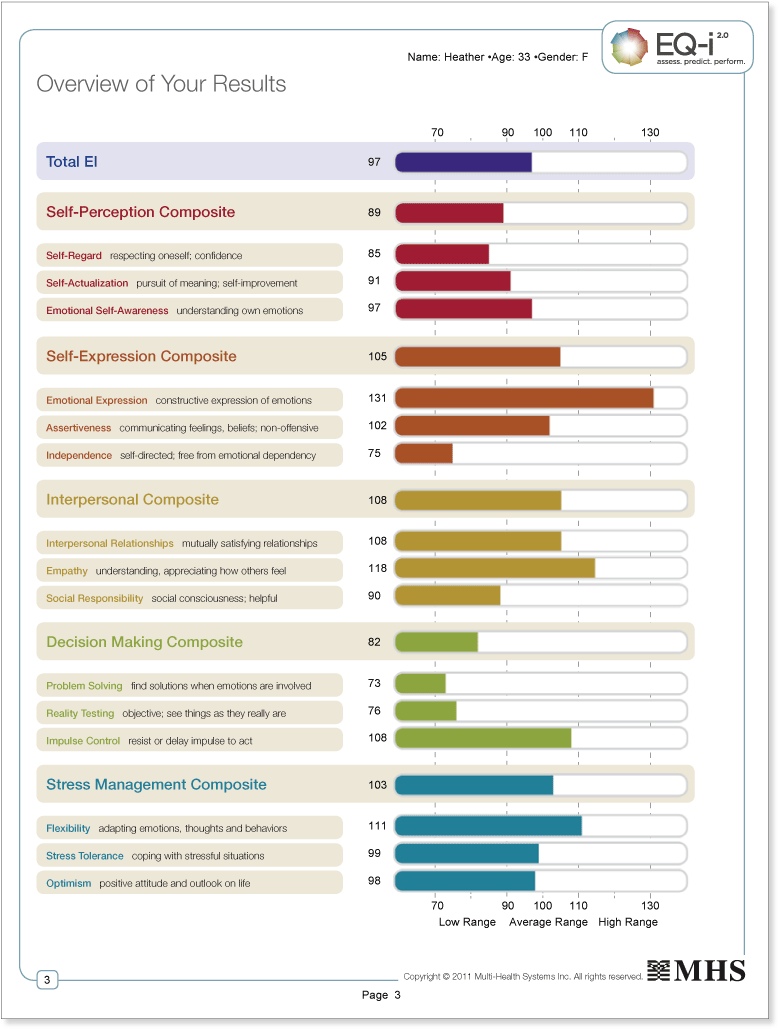Part IV: Using the Results
EQ-i 2.0 Case Studies
Case Study 7
Submitted by: Katie Ziemer
Client Background
Heather, a 33-year-old female executive assistant, completed the EQ-i 2.0 as part of an exploration exercise to guide decisions about whether or not to make a career change. In past conversations, this client has expressed excitement over several new career options in response to her discontent with her current role. She has been in an administrative role for most of her professional life but is recently questioning whether her career truly plays to her interest: directly helping people.
Prior to taking the EQ-i 2.0, the client shared that she would like to know more about where her strengths lay in order to make a more informed decision about what career change is best.
One aspiration that she discussed before completing the EQ-i 2.0, was to take a more entrepreneurial course in her career and start her own business.
Summary of EQ-i 2.0 Results

Heather’s profile graph reveals some interesting areas of both strength and opportunity. In a previous conversation, the client had mentioned that she feels like she copes well with the demands of her job but feels she has much more to offer, particularly when it comes to working with people. Her above average result on Empathy (118), Interpersonal Relationships (108) and Emotional Expression (131) seem to support her feelings of “wanting a job that puts her in close contact with people and allows her to truly help others.”
Reality Testing and Problem Solving are two areas that present as potential derailers should she seek her own business. Low scores in Reality Testing (76) and Problem Solving (73), coupled with both of these subscales being 30 points lower than Impulse Control (108), suggest a tendency for Heather to be delayed or paralyzed in decision making. Although generating exciting ideas may not be a problem, creating realistic plans to execute her ideas may be problematic. This concern is reinforced through her response of “occasionally” to the Reality Testing item “creating realistic plans to achieve goals.” Heather’s result in Independence, particularly her mid-range responses on items such as “I am more of a follower than leader” and “I find it hard to make decisions on my own,” suggest that while she likely has no shortage of great ideas, her ability to execute and follow through on them might be compromised, particularly if she is in a role where she alone has to react quickly to environmental demands and pressures.
Heather also presents with a Flexibility score that is higher than most other subscales on the EQ-i 2.0. As a result, Heather may appear to be less practical or pragmatic in her career decisions. Her Flexibility score coupled with low Reality Testing and Problem Solving interact in a way that may leave her susceptible to her high emotional investment/interest in a new direction without a realistic evaluation of whether she can indeed follow through with a given direction.
Coaching Approach & Development Strategies
The recommended coaching approach would be to set aside deciding on a career (which has likely spawned from her excitement to try something new without the realistic assessment of what a career change entails) and concentrate on two developmental areas:
- Gaining a clear understanding of her strengths and weaknesses
- Working through different decision making techniques and processes
Rationale
- Her response was that she only “sometimes” has a good sense of her strengths and weaknesses. There are clear subscales that could be strengths for her (i.e., Empathy [118], Emotional Expression [131], Flexibility [111] and Interpersonal Relationships [108]) where she may benefit from further understanding and realization. It may help her to examine real situations in her current role where she excelled in these areas and those outside of what the EQ-i 2.0 measures. She may need assistance in this activity because her slightly lower Self-Regard may lead her to being overly conservative in her evaluation of her capabilities.
- Building on this process, she may benefit from being introduced to some techniques for making decisions independently, including setting realistic goals and mapping out an action plan for achieving them. Although these should be small and short-term goals, they should be coupled with gathering more information about career options, and even completing additional career interest inventories. The crux of this developmental exercise would be for her to follow through on, and hold herself accountable for, completing an action plan for reaching these goals. She may need to watch her tendency to be overly expressive and that her emotions don’t overrule or overshadow an objective evaluation of a situation (i.e., extreme excitement about the idea of starting her own business versus how much commitment and follow through will be needed to get a start-up company off its feet).